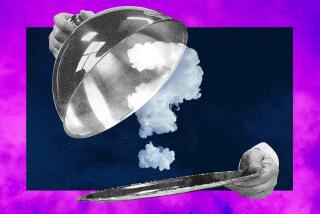Unorthodox uses for medicinal marijuana
- Share via
Buoyed by a recent federal court decision, a small but growing number of California doctors are treating patients with marijuana for a host of medical conditions, including some controversial ones, such as adult depression and attention deficit disorder in children.
Experts say most of these doctors are recommending medicinal marijuana only for the treatment of conditions for which there is some scientific research supporting its benefit: pain management, glaucoma and as an appetite enhancer for cancer and AIDS patients. But others already are raising concerns about doctors who recommend marijuana for purposes for which there is little or no science demonstrating its effectiveness.
It is common for doctors to use medications to treat “off-label” conditions for which the drug is not approved. However, some experts are concerned that patients using marijuana for unorthodox treatments may not be receiving medications proven to be effective.
Doctors are split about the overall safety of using marijuana. Some consider it extremely safe, noting that an estimated one-third of U.S. adults have tried it, with few reported medical complications. Others, however, contend that smoking marijuana may be as harmful as tobacco, doing more harm than good.
“Marijuana shows encouraging results in some areas like pain management and nausea. But there is little evidence to suggest it has any benefit beyond a few defined areas,” says Igor Grant, director of the University of California’s Center for Medicinal Cannabis Research in San Diego.
Physicians who recommend cannabis insist its health benefits are plentiful, and they advise patients to use it only after other medications and treatment have failed.
Dr. Claudia Jensen, a Ventura family doctor, says she is treating dozens of patients with marijuana for a range of medical conditions, including children with ADD.
Jensen acknowledges that the science is lacking to justify some of her unorthodox uses, but says she has seen many patients for whom marijuana is the only treatment that seems to work. For patients younger than 18, Jensen says she first recommends Marinol, an FDA-approved synthetic oral form of the drug available by prescription. If that doesn’t work -- and the children’s parents agree -- she recommends growing marijuana at home and incorporating the drug into prepared foods, such as brownies.
Only as a last resort does Jensen recommend young patients smoke the drug. She says the amount she recommends varies.
A spokeswoman for the Medical Board of California says that few doctors recommend marijuana as a treatment for children and that doing so isn’t necessarily improper. The board’s position, however, is that it should be done in only extreme cases, such as with cancer patients and only with careful doctor supervision.
The science surrounding medical marijuana is as controversial as its politics. A widely cited study in 1999 by the influential Institute of Medicine found that cannabis may benefit several conditions, especially pain and loss of appetite. The report found little evidence to support its use beyond those areas.
Separate research shows that marijuana may have counterproductive effects on young users. Dr. Martin Stein, a San Diego pediatrician who specializes in ADD, says that recommending marijuana to minors is “extremely controversial” and that “there are better and safer medications and behavioral treatments we have available to us.” The Bush administration’s position is that cannabis has no medical value, and it has strongly opposed its use by doctors. But last October, after challenges by the federal government, the 9th U.S. Circuit Court of Appeals ruled that doctors have a constitutional right to discuss marijuana with patients. The federal ruling covers California and four other states with their own medical marijuana laws.
Partially because of the ruling, some doctors say they are more comfortable with prescribing marijuana. Earlier this month, two Lake Forest doctors opened a storefront clinic for patients seeking medical marijuana. And San Francisco is studying how to set up growing cooperatives to provide marijuana to chronically and terminally ill patients in the city.
Many patients say they aren’t concerned with all the legal and scientific confusion surrounding marijuana. They just know it works for them. Matt Farrell, a 27-year-old Los Angeles cameraman, says he began smoking marijuana several times a day three years ago after his doctor recommended it to treat his recurrent depression and insomnia. Farrell says he tried a half dozen other medications first, including the antidepressants Paxil and Zoloft, but they either didn’t work or had too many side effects. “I have some medication before bed, or in the afternoon when I am feeling stressed. It just makes me feel better,” he says.
Frank Lucido, a Berkeley family physician who treats patients with marijuana for conditions including depression and post traumatic stress disorder, says he plans to continue recommending cannabis. “How are we ever going to know how much this drug can do unless we try?” he asks.






